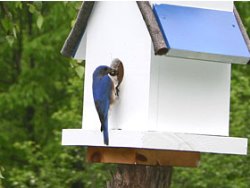
Many gardeners are aware that a particular class of widely used systemic insecticides known as neonecotinoids presents a big threat to bees and other pollinators. Now research has shown that these important insects are not the only creatures at risk from this class of pesticides. A recent study done by Dutch scientists suggests that neonicotinoids also cause declines in populations of insect-eating birds.
An article in the August 9, 2014 issue of Science News explains that the researchers analyzed data on water pollution as a means of assessing levels of neonicotinoids, as the pesticides are carried to waterways in runoff from farm fields. What they found was the greater the levels of imidacloprid, the most commonly used neonicotinoid, in the water, the greater the decrease in the number of 15 common farmland species of birds over time. Researchers speculated that the birds' decline occurred when the pesticide spreads beyond farm fields, killing off many insects and reducing the birds' food supply. But they acknowledged that the pesticide could also be harming birds directly; more study is needed to identify the precise means of harm.
While ecologists have suspected that these pesticides were having a negative effect on species other than pollinators, this this the first study that finds direct evidence of broader harm. In 2013 the use of several neonicotinoids was restricted in Europe due to concerns about effect on pollinators, while in the U.S. the EPA is still reviewing their effect on pollinators. Home gardeners can make sure they are not contributing to the decline of bees or birds by avoiding the use of this class of pesticide on their lawns or in their home landscapes.
To read more about this study, go to Science News.